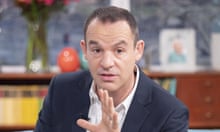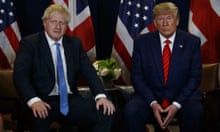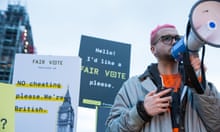In the frantic battle against falsehoods produced by enterprising Macedonian teenagers, crackpot conspiracy theorists and, with alarming regularity, the White House, the weapon of choice has been facts, and with it the venerated practice of fact-checking.
As the Guardian’s Martin Belam argued last week, journalism has to get better at spreading facts; at making its case and showing people what is really going on.
But it is increasingly clear that every attempt to do so will face countermeasures from those who don’t like the facts or the way they are presented.
On Monday, left-leaning US non-profit Media Matters put out a warning to European fact checkers that conservative outlets would attempt to discredit them with attacks on their independence, impartiality and the backgrounds of their staffers. It cited articles from the likes of Breitbart, Fox and the Daily Caller attacking fact-checkers in both the US and Germany.
It’s a warning that should be heeded. Just as the the US president, Donald Trump, calls news organisations and reporters he doesn’t like “fake news”, so outlets with a reckless approach to the truth will hit back by attacking the fact checker, not the fact.
But the picture is hugely complicated by the existence of fact-checkers that really do appear to have a bias or agenda.
Last month the Guardian covered Mediekollen, a Swedish Facebook page ostensibly checking the mainstream media’s facts but actually putting forward counter-arguments to attack outlets and stories that did not fit what appeared to be a rightwing, anti-immigrant agenda.
That was a relatively amateurish operation that was closed down shortly after the Guardian’s story, but there are far more sophisticated fact-checkers out there that do not fit the model that has so far given organisations such as Snopes, Politifact or FullFact legitimacy.
Step forward Fact Checking Turkey, which describes its mission as monitoring the “the factual accuracy of various news and claims about Turkey”. It has a professional website and style, publishing in English and Arabic. It also sometimes has a point, picking out inaccuracies in western reports on Turkey, or, more questionably, providing alternative facts that contradict its implications. .
It only becomes clear that something isn’t right when the total output of Fact Checking Turkey is taken into account. Almost every single post in some ways supports the actions of the Turkish government or the reputation of Turkey. For instance, it has a whole section devoted to press freedom, in which it challenges accusations that the media is under threat in Turkey, a country which according to the Committee to Protect Journalists, locks up more journalists than any other.
There is a pretty simple explanation for the sophistication. The site is not a small standalone project or Facebook-based popup, it has the backing of an “independent non-governmental organisation” called Bosphorus Global.
Asked to comment on the prevalence of pro-government lines, a spokesperson for Bosphorus said: “Foreign media outlets have an anti-Turkish government stance, so our fact checks, much as we pay strict attention to neutrality, naturally seem pro-government. As for transparency, all our articles are double-checked by our editors and we make sure we provide readers with references. If there are missing references, we do not publish stories.”
But the other operations run by Bosphorus also suggest it is likely to take a less than impartial approach to fact-checking. It runs FETO Facts, the “only extensive English source on the structure and the past of Gulenist terror network”. Whatever your opinions about the Gulenist movement (and the Turkish government does list it as a terrorist movement) focusing on one organisation betrays a particular viewpoint.
Then there is the prominent link from Fact Checking Turkey to “Facts on the Peoples’ Democratic Party”, better known as the HDP, a pro-minority party with links to the PKK, a proscribed organisation in Turkey that is in conflict with the government. The HDP page currently displays four stories about alleged links between the HDP and PKK, all below blood-red text.
Bosphorus also, incidentally, arranged Lindsay Lohan’s trips to visit refugees in Turkey, which was an interesting and quite possibly effective approach to highlighting Turkey’s role in sheltering those fleeing conflict. Laudable, but hardly unbiased.
Fact Checking Turkey and Bosphorus’s other operations show a clear pro-government bias, yet Bosphorus has done a good job of adopting not only the visual cues and language of fact-checking, but also some of the processes that give the very notion credibility. For anyone who broadly agrees with their stance, its output provides effective ammunition for argument, and a justification for rejecting alternative views.
Both the existence of sites like Fact Checking Turkey and the attacks on the integrity of established fact-checkers show that we are only at the start of an increasingly complex competition between competing narratives.
It’s unfortunate the word Infowars has already been taken by Alex Jones’s conspiracy heavy, Trump-cheering media operation, because it’s a portmanteau that better than anything sums up the position in which we’ve found ourselves.
It’s a total information war in which the combatants are prepared to use everything from the conventional weapons of rigorous reporting and government press releases, to weapons of mass deception including fake news and declaring the press the “opposition party”. Because it’s taking place in our online social spaces, there are no civilians, just people to be enlisted to one side or the other.
Fact-checking and fact-checkers will play an important and valuable role in that battle, but they are not all going to be on the same side – nor are they going to be the decisive factor in winning the war.









